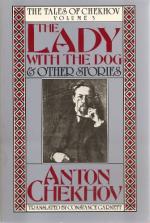|
This section contains 2,720 words (approx. 10 pages at 300 words per page) |

|
SOURCE: "Chekhov's Realism," in Soviet Literature, No. 1 (442), 1985, pp. 154-60.
In the following essay Palievsky discusses Chekhov's positive depiction of the common people, maintaining that the writer "formed an invisible link between a high ideal and the perceptions, requirements, tastes and foibles of the ordinary man. "
Chekhov, viewed in historical perspective, gives the ideal of Russian literature a new impetus or, perhaps, considering the distinctive features of his work, one should say that he gives it new substance. In him, literature regains its primary solidity, restores and develops its sovereign mode of thought and image of life, and its objectivity is strengthened. Life (in all its fullness and through artistic imagery) comes into its own, asserting its primacy over dreams, negations, fantasies, impulses of the moment and projects no matter how wonderful they may be. Much more wonderful than all this is Chekhov's infinite truth of reality.
However, Chekhov...
|
This section contains 2,720 words (approx. 10 pages at 300 words per page) |

|


